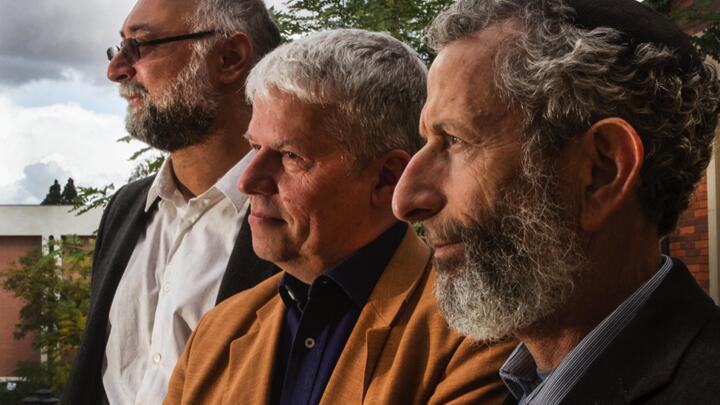World Religions – Finding Common Ground
-
Add to Calendar 2016-08-31 17:00:00 2016-08-31 18:30:00 World Religions – Finding Common Ground DML 241 - USC Sidney Harman Academy for Polymathic Study 05:00 pm 06:30 pm America/Los_Angeles public

"In essentials unity, in non-essentials liberty, in everything love.” --Moravian proverb, circa 1450 c.e.
Much is made these days about the differences between us. But Christian, Jewish and Muslim religious traditions and ideology have evolved from a common source and share many ideas and core beliefs. Is it possible for Muslim, Christian, Jewish Americans and global citizens to come together and live in community and in peace? Can we celebrate that which unify us across faiths and accept, even embrace, that which gives us our uniqueness? To open our fall 2016 Polymathic Program, three internationally renowned religious scholars in the traditions of Judaism, Catholicism, and Islam—Rabbi Reuven Firestone, Pim Valkenberg, and Amir Hussain—will hold a discussion on the issues that have historically divided us—race, faith, and violence—with a genuine desire to promote a deeper understanding of ourselves and others. Varun Soni, Dean of the Office of Religious Life, will moderate. There will be opportunity for students to engage the guest discussants and each other.

Amir Hussain, Pim (Wilhelmus G.B.M.) Valkenberg, & Rabbi Reuven Firestone
Amir Hussain, a Canadian Muslim, is professor of Theological Studies at Loyola Marymount University, where he teaches courses on Islam and world religions. An expert in the subject of contemporary Muslim societies in North America, Amir is the author or editor of five books and well as over 50 scholarly articles and book chapters and from 2011 to 2015, served as editor of the Journal of the American Academy of Religion. He is currently finishing a book on how American Muslims have woven themselves into the fabric of American life, titled Islam and the Building of America. His deep commitment to interfaith work (especially among Jews, Christians, and Muslims) is evident in his teaching and his scholarly work, and one of the most important reasons we invited him to take part in the first “scholars in residence” program.
Pim (Wilhelmus G.B.M.) Valkenberg was born in the Netherlands where he studied both theology and religious studies. His field of specialization is Christian - Muslim dialogue in the context of Abrahamic partnership, both in the present and in the (Medieval) period. He is also interested in Christology, Hermeneutics, comparative theology, mysticism, and the study of the Qur'an. Pim has taught at the (then) Catholic University of Nijmegen, Loyola University Maryland in Baltimore and is currently professor of Religion and Culture in the School of Theology and Religious Studies at the Catholic University of America in Washington, D.C. Among his edited and authored books in the field of inter religious dialogue are: The Polemical Dialogue (1997), Christology and Dialogue (1997, Dutch), God and Violence (2002, Dutch), In the Footsteps of Abraham (2004, Dutch), and Sharing Lights on the Way to God: Muslim-Christian Dialogue and Theology in the Context of Abrahamic Partnership (Brill/Rodopi, 2006). Pim also participated in the “Learned Ignorance” project of the Institute for Advanced Catholic Studies.
Rabbi Reuven Firestone grew up in Northern California and was educated at Antioch College, the Hebrew University in Jerusalem, Hebrew Union College where he received his M.A. in Hebrew literature in 1980 and Rabbinic Ordination in 1982, and New York University where he received his Ph.D. in Arabic and Islamic studies in 1988. He serves as is the Regenstein Professor in Medieval Judaism and Islam at Hebrew Union College in Los Angeles and on the faculty of the School of Religion and the Middle East Studies Center at USC. Firestone’s books include An Introduction to Islam for Jews, Children of Abraham: An Introduction to Judaism for Muslims, Jews, Christians, Muslims in Dialogue: A Practical Handbook, with Leonard Swidler and Khalid Duran, and Who are the Real Chosen People: The Meaning of Chosenness in Judaism, Christianity and Islam. He also co-edited, with Professors James Heft S.M. and Omid Safi, Learned Ignorance: An Investigation into Humility in Interreligious Dialogue between Christians, Muslims and Jews. Professor Firestone has served as vice president of the Association for Jewish Studies (AJS) and the president of the International Qur’anic Studies Association (IQSA). He has lived with his family in Israel, Egypt and Germany, and has initiated and been involved in numerous projects, which bring together Jews and Christians and Muslims, Jews and Arabs, and Israelis and Palestinians.